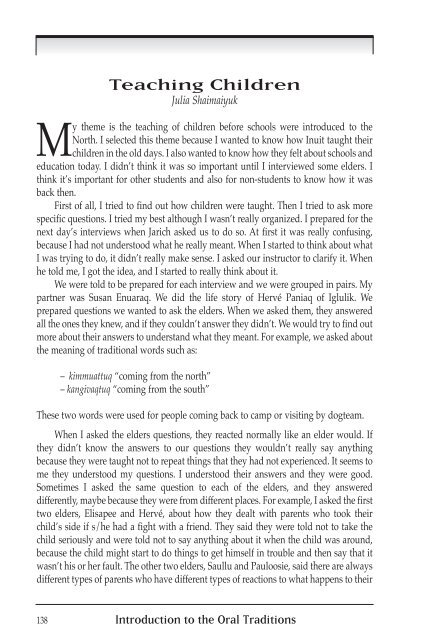Introduction-E
Introduction-E
Introduction-E
You also want an ePaper? Increase the reach of your titles
YUMPU automatically turns print PDFs into web optimized ePapers that Google loves.
Teaching Children<br />
Julia Shaimaiyuk<br />
My theme is the teaching of children before schools were introduced to the<br />
North. I selected this theme because I wanted to know how Inuit taught their<br />
children in the old days. I also wanted to know how they felt about schools and<br />
education today. I didn’t think it was so important until I interviewed some elders. I<br />
think it’s important for other students and also for non-students to know how it was<br />
back then.<br />
First of all, I tried to find out how children were taught. Then I tried to ask more<br />
specific questions. I tried my best although I wasn’t really organized. I prepared for the<br />
next day’s interviews when Jarich asked us to do so. At first it was really confusing,<br />
because I had not understood what he really meant. When I started to think about what<br />
I was trying to do, it didn’t really make sense. I asked our instructor to clarify it. When<br />
he told me, I got the idea, and I started to really think about it.<br />
We were told to be prepared for each interview and we were grouped in pairs. My<br />
partner was Susan Enuaraq. We did the life story of Hervé Paniaq of Iglulik. We<br />
prepared questions we wanted to ask the elders. When we asked them, they answered<br />
all the ones they knew, and if they couldn’t answer they didn’t. We would try to find out<br />
more about their answers to understand what they meant. For example, we asked about<br />
the meaning of traditional words such as:<br />
– kimmuattuq “coming from the north”<br />
– kangivaqtuq “coming from the south”<br />
These two words were used for people coming back to camp or visiting by dogteam.<br />
When I asked the elders questions, they reacted normally like an elder would. If<br />
they didn’t know the answers to our questions they wouldn’t really say anything<br />
because they were taught not to repeat things that they had not experienced. It seems to<br />
me they understood my questions. I understood their answers and they were good.<br />
Sometimes I asked the same question to each of the elders, and they answered<br />
differently, maybe because they were from different places. For example, I asked the first<br />
two elders, Elisapee and Hervé, about how they dealt with parents who took their<br />
child’s side if s/he had a fight with a friend. They said they were told not to take the<br />
child seriously and were told not to say anything about it when the child was around,<br />
because the child might start to do things to get himself in trouble and then say that it<br />
wasn’t his or her fault. The other two elders, Saullu and Pauloosie, said there are always<br />
different types of parents who have different types of reactions to what happens to their<br />
138 <strong>Introduction</strong> to the Oral Traditions


